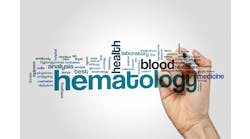American Society of Hematology Data Hub Develops COVID Registry
The ASH Research Collaborative, established in 2018 by the American Society of Hematology, has created a Data Hub technology platform that aggregates research-grade data on hematologic diseases. This spring, ASH stood up a COVID-19 Registry for Hematology that captures data on individuals who test positive for COVID-19 and have a hematologic condition or have experienced a post-COVID-19 hematologic complication.
Bill Wood, M.D., M.P.H., chair of the Data Hub Oversight Group, recently described the Data Hub and how ASH has developed a model for data gathering and sharing that can be replicated condition by condition. ASH chose to start with sickle cell disease (SCD) and multiple myeloma. “Within each program we develop a network of sites contributing data to that disease area. We do direct EHR integration to gather structured data. We can bring in other types of unstructured data, including genomic and molecular data,” said Wood, who is also an associate professor of medicine at the University of North Carolina. “We are working to make the data sets more patient-centered by adding patient-reported outcomes and patient-generated health data.”
The long-term goal of the ASH Research Collaborative is to address the entire spectrum of malignant and nonmalignant hematologic diseases, which means the Data Hub will expand its scope once its initial efforts have reached maturity. Currently, the Data Hub houses data on more than 3,000 patients with SCD and 2,000 patients with multiple myeloma.
Wood was speaking during a Sept. 1 Council of Medical Specialty Societies webinar on using clinical registries to address disparities in COVID-19. The Data Hub is collecting data on the COVID-19 and its impact on individuals living with hematologic conditions. As data are received and analyzed from around the globe, real-time observational summaries are made publicly available via a dashboard, with filters for different hematologic conditions.
The COVID-19 pandemic has unique implications for individuals living with blood diseases because of their markedly increased risk of infection. Early published evidence suggests that individuals living with cancer, and potentially even those in remission, may be susceptible to increased morbidity and mortality from COVID-19.
In addition, the ASH Research Collaborative web site notes that COVID-19 has recently been associated with hematologic complications, such as coagulopathy and venous thromboembolism, even if a patient has no known history of a hematologic condition. Existing data are limited and may not be generalizable; therefore, there is an urgent need to rapidly collect and disseminate observational data to help provide insights to those on the front lines of the pandemic.
As an example of the value of medical society registries, Wood said that data from the Data Hub is being used to improve care and outcomes at the site level and to work on quality improvement initiatives. “We work with sites to develop support for clinical guideline implementation, and ASH has developed a variety of clinical practice guidelines. We are developing a suite of personalized analytics and decision support tools that can be used at the point of care. We can help identify cohorts for clinical trial networks, and we can develop evidence for pre- and post-market research. We also are facilitating academic research.”
ASH has ongoing efforts to address disparities in treatment in its SCD and multiple myeloma communities, Wood said. For instance, participation in an SCD clinical trials network requires implementing a community advisory board. Other goals include increasing awareness of clinical trials and reducing barriers to participation, creating learning networks to promote shared decision-making and generating real-world evidence.
“We have a keen interest in social determinants of health,” Wood said. As the research collaborative grows to other conditions hematologists treat, community engagement will remain a bedrock, he added.


